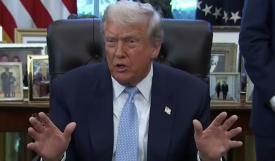FCC Chairman Circulates Revised Open Internet Rules After Public Outcry
Amid a large and growing backlash from advocacy groups and top internet companies to the Federal Communication Commission's draft Open Internet proposal, the FCC is considering yet a new draft to mollify critics. The changes reportedly emphasize the FCC's willingness to reclassify broadband providers if anti-net neutrality practices become widespread.
Some details of the new language in the FCC's proposed Open Internet rules were leaked to the Wall Street Journal late last weekend, and it appears that the public campaigns against the previous draft have worked -- at least in part. FCC Chairman Tom Wheeler has reportedly drawn up a more robust proposal, attempting to placate critics -- from advocacy groups to internet giants like Google, Facebook, Netflix, and Yahoo, to some of the FCC's own commissioners -- who said the previous draft rules to regulate internet service providers (ISPs) would allow them to create a "fast lane" that would discriminate against web services and sites that can't afford to pay a premium.
The revised draft Open Internet rules take the same approach to regulating ISPs but make it clear that the FCC would make sure that ISPs were not unfairly treating websites and services that don't pay for enhanced traffic delivery. Those rules, which critics have said creates a "fast lane" for paying customers, emphasize services like health monitoring as a case example.
The FCC's new language also puts the option of reclassification of ISPs under Title II of the Telecommunications Act as a stronger fallback option should ISPs begin to play favorites unfairly. Title II reclassification refers to officially calling ISPs a public utility, like electricity or landline telephone services, which would allow for more stringent government regulation and is something that some net neutrality advocates have been arguing should be the first step.
The Open Internet is the FCC's regulatory structure for enforcing net neutrality. The previous incarnation from 2010 was struck down in January of this year by a federal appeals court, which said the FCC had incorrectly classified ISPs and was regulating them under an incorrect authority structure. In April, details on the new Open Internet rules leaked to the press, including the "paid prioritization" measure, which contradicts net neutrality's principle that "all traffic should be treated equally."
This inevitably led to a firestorm of criticism so intense that the FCC changed its outgoing message on its main consumer phone line asking for comments on the Open Internet rules to be submitted by email -- indicating that the agency was receiving so many calls that it was flooding its phone lines.
It's unlikely that the recent minor changes to the Open Internet rules will placate critics since it appears the "paid prioritization" measure is still on the table in one form or another. The FCC will meet on Thursday, May 15, for its first round of voting on the new Open Internet rules, which won't fully approve the measure but will only change its status to a "notice of proposed rulemaking," making the draft available to the public for review and comment.
The FCC can expect another deluge of comments and criticism starting later this week.
Subscribe to Latin Post!
Sign up for our free newsletter for the Latest coverage!
© 2025 Latin Post. All rights reserved. Do not reproduce without permission.















